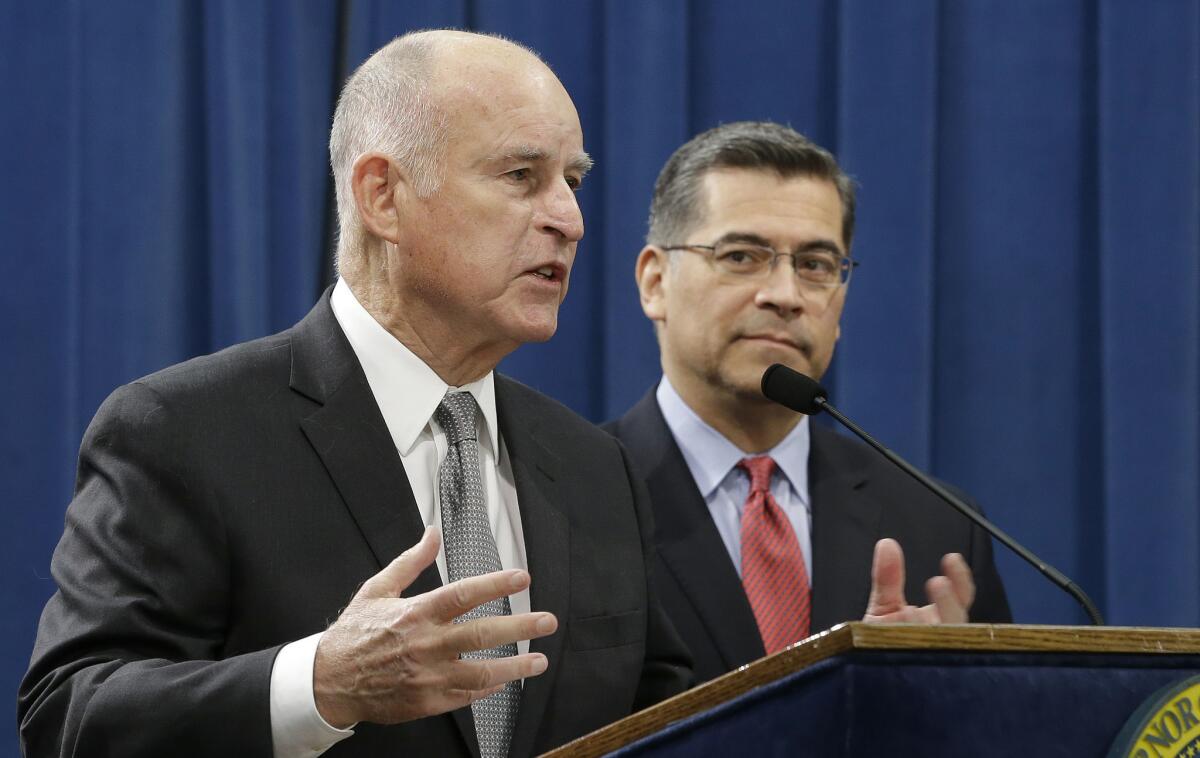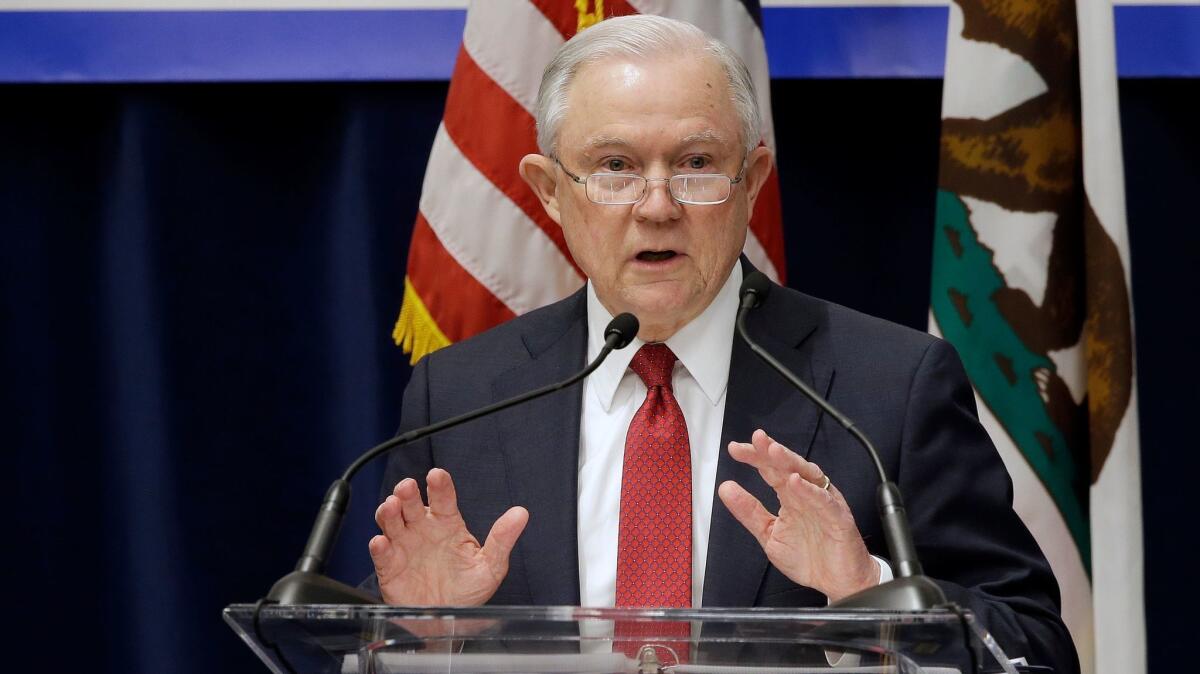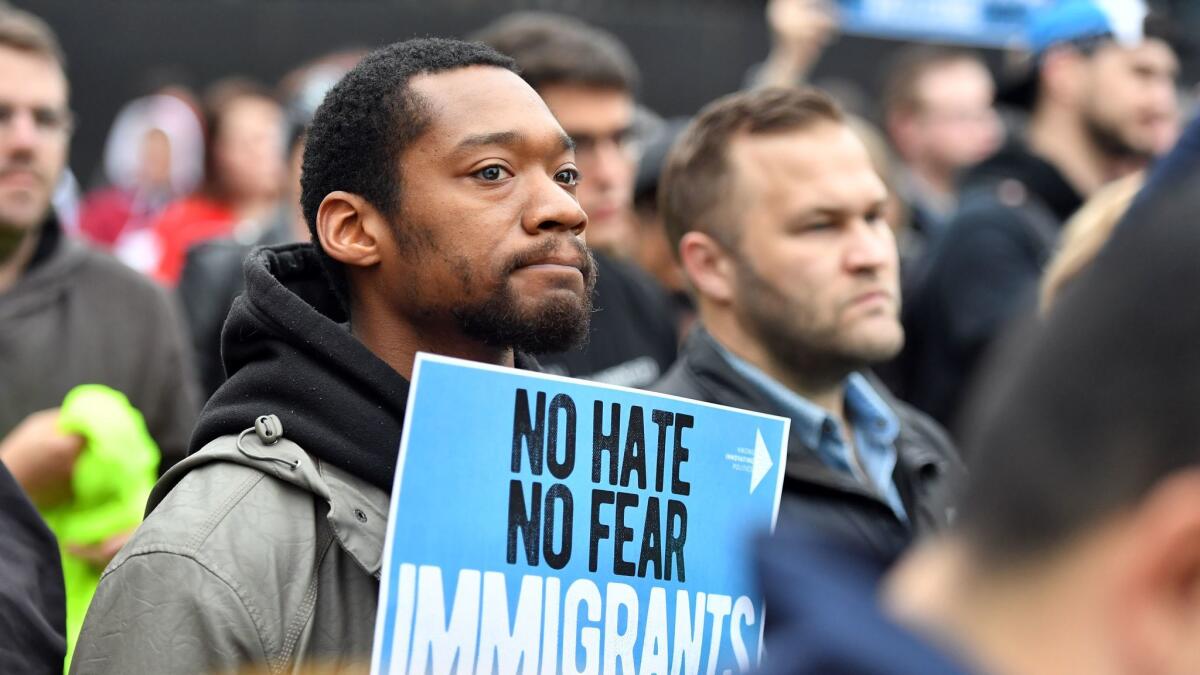Capitol Journal: Sessions did the California Democratic Party a big favor with his visit to the state

- Share via
We’ve seen this movie many times: A prominent Republican attacks illegal immigration. The shriveling GOP base cheers. Latinos feel threatened. And California Democrats become even stronger.
It’s an ongoing rerun that debuted in 1994. Republican Gov. Pete Wilson aggressively campaigned for Proposition 187, which sought to deny public services to immigrants here illegally. It passed overwhelmingly. Courts found it unconstitutional. Latinos were awakened. And they turned away from Republicans.
Today Republican voter registration is so low in California that it’s virtually even with “no party preference” — 25.4% to 25%. Democrats are at 44.6%. Republicans no longer are competitive in statewide races. And Democrats lopsidedly control the Legislature along with the state’s congressional delegation.
That isn’t just because Republicans haven’t stopped hammering on illegal immigration, which has prodded Latinos to the polls, where they tend to vote for Democrats. But it’s a big reason.
President Trump has been a nonstop generator of Latino votes for Democrats. It started with his candidacy announcement in 2015, riding down that escalator and characterizing Mexicans migrating to the U.S. illegally as rapists, drug dealers and violent criminals.
“Some, I assume, are good people,” he said.
That rhetoric plays well in some red states. But not in this state, the nation’s most populous, most diversified — and now among the deepest blue.
Regardless of this unlearned lesson the GOP refuses to grasp, U.S. Atty. Gen. Jeff Sessions charged into Sacramento on Wednesday to announce a federal lawsuit challenging three so-called sanctuary state laws enacted last year by the Legislature and Gov. Jerry Brown.
That wouldn’t have stirred up anyone. After all, California has been filing suits right and left challenging Trump administration policies, particularly on immigration. But Sessions also gave a blistering speech to a law enforcement group, attacking California, claiming it was trying to block the federal government from rounding up undocumented immigrants and deporting them.
And Trump — riling Latinos even more and further pushing them into Democratic arms — will fly to California next week for the first time as president. And naturally he’ll go to San Diego to inspect prototypes for his proposed border wall. The GOP flick keeps running.

In his speech, Sessions said California was full of “lawless open-borders radicals” and run by people “protecting lawbreakers and giving all [immigration] officers more dangerous work to do so that politicians can score political points.”
“Federal law is the supreme law of the land,” he said. “I would invite any doubters to go to Gettysburg or to the tombstones of John C. Calhoun and Abraham Lincoln…. Open borders is a radical, irrational idea that cannot be accepted…. So California, [it] absolutely appears to me, is using every power it has — powers it doesn’t have — to frustrate federal law enforcement. So you can be sure I’m going to use every power I have to stop them.”
Brown and state Atty. Gen. Xavier Becerra pretty much denied all of it during a post-speech news conference.
“This is really unprecedented for the chief law enforcement [officer] of the United States to come out to California and act more like Fox News than a law enforcement officer,” said Brown, shouting and holding little back.
Unprecedented without question. I can’t remember a time when Washington and California were at each other’s throats like this — particularly the U.S. attorney general and a governor, regardless of parties in power. No mutual respect. Little civility.
In this ugly climate, federal-state cooperation seems impossible.
But that’s probably a reflection of today’s national culture more than it is the individuals involved. Blame it, in large part, on impersonal social media where people communicate without having to look at each other in the eye. Standards decline and Americans elect a classless president who sets the tone even lower.
Coverage of California politics »

Brown, however, pinned the immediate blame on Sessions.
“I’ll cooperate, Jeff, if you can get off this current maneuver you’re on because it’s unbecoming,” Brown told reporters.
“This lawsuit — they’re talking about going to the Supreme Court,” Brown said. “This lawsuit is going to last a lot longer than the Trump administration.
“This is a political stunt,” Brown insisted. “It’s about dividing America … division and discord…. Like so many in the Trump administration, this attorney general has no regard for the truth. What he said [in the speech] is not true. It is a lie.
“There [were] three lies” in Sessions’ speech, the governor concluded.
One was that Brown and other California Democrats favored open borders. Two, that they were trying to protect criminals. Three, that California was trying to secede from the nation. “Not true.”
Brown was proud of the compromise he negotiated with state Senate leader Kevin de León (D-Los Angeles) on the sanctuary state bill. Basically it amounted to forbidding state and local cops from helping federal agents capture and deport undocumented immigrants who had been staying out of legal trouble. But it instructed them to help boot out criminals convicted of violent or serious crimes.
Around 800 crimes were listed as red lines that couldn’t be crossed.
In January, a poll by the Public Policy Institute of California found that 58% of likely voters favored state and local governments making their own laws to protect undocumented immigrants.
“While the Trump administration is trying to rile and coalesce its own base, it’s doing the same with the fastest growing segment of the electorate, Latinos,” says longtime Republican political consultant Mike Madrid.
The Democratic Party should pay for more Sessions trips to California.
Follow @LATimesSkelton on Twitter
Get the L.A. Times Politics newsletter
Deeply reported insights into legislation, politics and policy from Sacramento, Washington and beyond. In your inbox three times per week.
You may occasionally receive promotional content from the Los Angeles Times.








